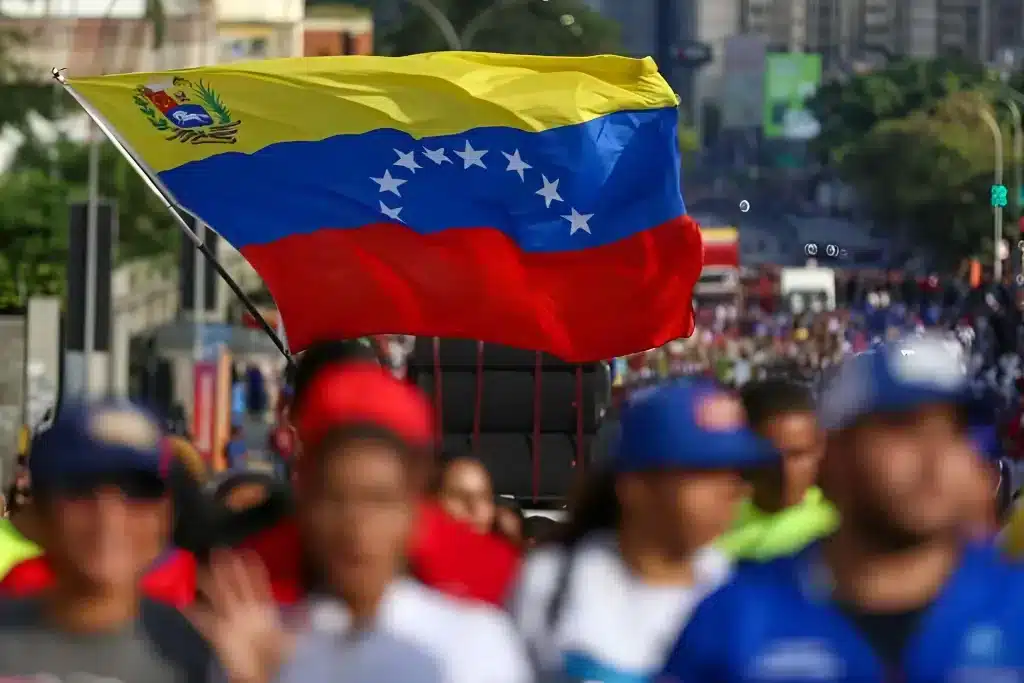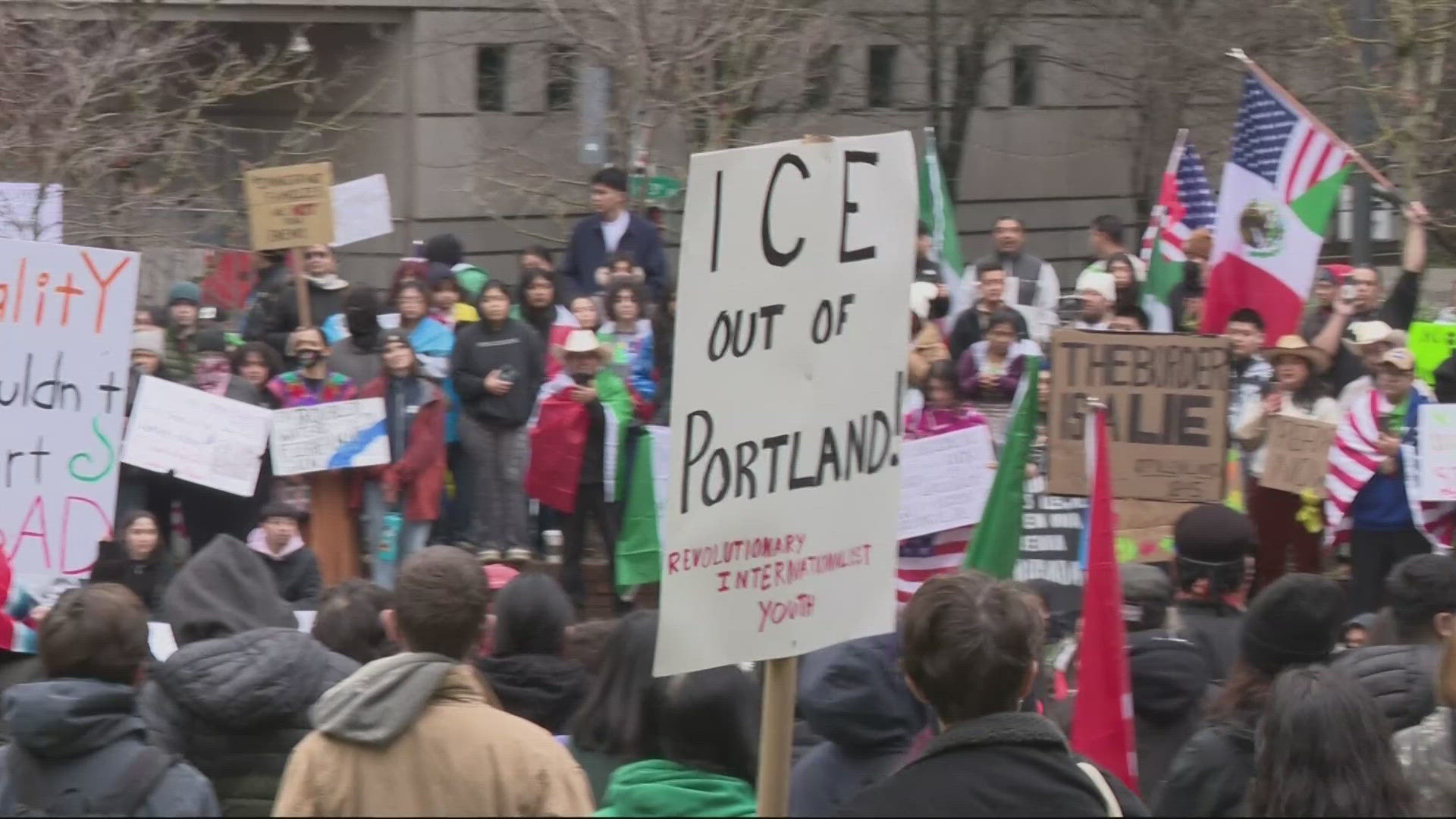
A big Venezuelan flag being waved by a marcher in Caracas demanding United Nations to prevent a US military aggression against Venezuela, October 6, 2025. File photo.

Orinoco Tribune – News and opinion pieces about Venezuela and beyond
From Venezuela and made by Venezuelan Chavistas

A big Venezuelan flag being waved by a marcher in Caracas demanding United Nations to prevent a US military aggression against Venezuela, October 6, 2025. File photo.
By Becca Renk – Oct 16, 2025
Portland, Oregon was my sanctuary as a teenager. I was a weird kid, a label I mostly embraced. But being different in my hometown rural north Idaho was exhausting. When I needed to recharge myself, I would drive the nine hours to Portland to bask in the city that accepted me just as I was. Maybe that is the Trump administration’s problem with Portland today: it is literally a sanctuary city.
Oregon became the first state to pass a sanctuary bill in 1987. Thirty years later, Portland passed a sanctuary city resolution. These laws prohibit state and city officials, including police, from cooperating with federal immigration enforcement.
Since September, President Trump has been threatening to send National Guard troops into Portland, ostensibly to quell protests in what he calls a “burning hell hole.” Oregon lawmakers on both sides of the aisle, however, united to reject this federal intervention in the Rose City, and are working together to prevent it.
Why is Portland a threat?
The real threat that Portland represents is not anarchy, but the opposite: government working together with its populace to create a welcoming, supportive community, in spite of differences. Portland is proof to America that it is still possible to work together to benefit everyone in our society.

To add insult to injury, Portland is pushing back with a sense of humor. The lone man in a chicken suit protesting outside ICE headquarters has now been joined by a panda, a dinosaur, an axolotl, and a unicorn for nightly dance parties.
This past weekend an “emergency naked bike ride” was organized in the city under the slogan, “if the emperor refuses to wear clothes, neither will we.”
Admittedly, it’s hard to send the National Guard in to arrest naked people and dancing frogs without looking ridiculous.
Model of subjugation
As amusing as this is, the consequences of a policy of unleashing the “full force” of the military on all those who disagree with Trump are deadly serious, wherever they happen.
We are seeing that this strategy to intervene and subjugate peaceful cities like Portland and Chicago is actually modeled after the strategy that has been used to attempt to subjugate the peaceful country of Venezuela for years: manufacture stories of crime without proof and send in troops, allegedly to make the target safe, but the real goal is domination.
In the case of Portland, the “crime” is the nonexistent violent protests. In the case of Venezuela, the “crime” is non-existent drug cartels trafficking along Caribbean routes that the UN and even the DEA say don’t exist.
Venezuela: a unifying force
In 2023, I had the opportunity to visit Venezuela and I saw firsthand how, like Portland, Venezuela is a unifying force: in its case, strategically allying with vulnerable Latin American and Caribbean countries.
My family went to Venezuela with more than 550 athletes from Nicaragua to participate in the ALBA Games, similar to the Olympics, but for ALBA countries.

ALBA is the Bolivarian Alliance for the Peoples of Our America, which was initiated 20 years ago by Venezuela and Cuba as an alternative to the Free Trade Area of the Americas proposed by the US. Rather than seeking to benefit big business, ALBA trade is based on complementarity, solidarity and cooperation. Members of ALBA currently have expanded to include Antigua and Barbuda, Bolivia, Dominica, Grenada, Nicaragua, Saint Kitts and Nevis, Saint Lucia, and Saint Vincent and the Grenadines.
For the ALBA Games, the Venezuelan government sent two planes to Nicaragua to fly us directly to Caracas. We were greeted at the airport with traditional Afro-Caribbean drumming and taken to a five-star hotel–courtesy of the Venezuelan government–a few blocks from the gym where we competed. Our team went straight up to the 18th floor, four more floors than the tallest building in Nicaragua. We stood open-mouthed by the rooftop pool as brilliant blue and yellow parrots flew past at eye level.
“Is this what it’s always like to travel?” One of our teen athletes asked me. I laughed out loud.
“Enjoy it while you can,” I said.
Strengthening connections
Enjoy it we did. For two weeks we trained, competed, and were tourists: taking a cable car to the top of the mountain looming above us, visiting malls, eating cachapas and arepas.
But most importantly, we made connections: we went out in our official team jackets and Venezuelans stopped us to talk about Nicaragua. Although the two countries are close geographically and politically, most people never get the chance to travel between them. Every conversation felt like meeting a kindred spirit: the nurse who gave me a bracelet made by her daughter, the street vendor who shared life goals with me, the youth representative who sends me links to Bolivarian Revolution videos. We all left Venezuela recharged, with the bonds between our small countries strengthened.
Oil profits for the people
I learned from my conversations that Venezuela uses profits from the country’s oil production–the largest reserves in the world–to significantly improve the lives of the poor majority. But following President Hugo Chávez’s death in 2013 and the subsequent election of President Nicolás Maduro, the US ratcheted up its regime-change efforts against Venezuela, supporting an opposition that attempted to achieve by violence what they could not win at the ballot box.

In 2014, Venezuelans suffered violent “guarimbas,” along with looting, scarcity, and even deaths. In an effort to push Maduro out, the Obama administration in 2015 also began moving toward a full economic blockade; there are currently more than 1,000 crippling unilateral coercive measures (sanctions) against Venezuela by the US and allies.
Deadly sanctions
“It’s been a brutal attack,” Daniel Rivas told me. Daniel is a young member of the ruling PSUV party and was a teenager when the sanctions intensified.
“It’s been impossible to import medicines, people have died as a direct result of the sanctions. During the pandemic we weren’t allowed to purchase the vaccines. These sanctions are a massive violation of basic human rights.”
Refinement and sale of Venezuela’s rich oil production has been severely limited by sanctions, strangling the economy. “We have oil, but we can’t export it,” explained Daniel. “It’s like I’ve got a huge store full of clothing, but I can’t sell any of it because you’re blocking my doorway.”
Venezuela’s creative solutions
To offset effects of inflation, the Venezuelan government has invented new ways to help its people:
– The government heavily subsidizes access to food, water, electricity and gasoline.
– Health care is completely free for everyone.
– Public education is free, preschool through university.
– Support for farmers and co-ops has allowed Venezuela to become increasingly food sovereign, growing its own food instead of relying on imports.
Thanks to these and other programs, Venezuelan families have some of their basic needs met and the Venezuelan economy has turned around in a short time: recovering from 2,000,000% inflation to record a 5% GDP growth in 2023.
Threat of a good example
If Venezuela, even under brutal sanctions, can provide for its citizens basic needs, why can’t the richest country in the world do the same?
That question is the reason that Washington must crush Venezuela by any means. If Americans were to see what is truly happening in Venezuela, they would demand the same of their own government.
To add insult to injury, Venezuela has also been a leader in promoting regional unity independent of the US. Venezuela’s persistence in uniting with other vulnerable countries to work together for the benefit of their populations in ways that don’t follow Washington’s script also makes it a threat.
“Divided we croak”
As the US continues to add to the body count with its illegal extrajudicial murders in the Caribbean, Venezuela is showing restraint in not responding and using all available legal channels to avoid a military invasion. A US attack on Venezuelan soil may be imminent.
As ICE agents try to provoke confrontations with protestors in Portland, the city is showing restraint in not responding and is using all available legal channels to avoid a military invasion. A National Guard deployment into Portland may be imminent.
In these tense times, international solidarity is important. We have to protect our sanctuaries and unite with one another. Because, as the signs outside ICE headquarters in Portland say: “United We Ribbit, Divided We Croak.”
(Resumen Latinoamericano – English)

Becca Renk grew up in North Idaho and has lived in Nicaragua since 2001 working in sustainable community development in Ciudad Sandino with Jubilee House Community and its project Center for Development in Central America.